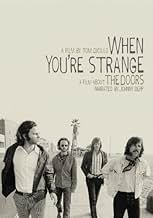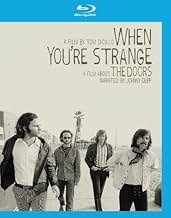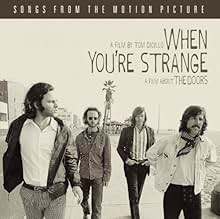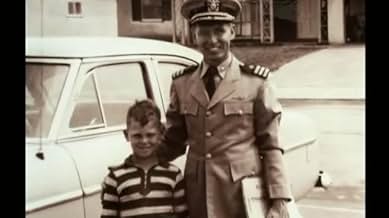A look at the late '60s and early '70s rock band The Doors, including rare exclusive footage.A look at the late '60s and early '70s rock band The Doors, including rare exclusive footage.A look at the late '60s and early '70s rock band The Doors, including rare exclusive footage.
- Awards
- 2 wins & 1 nomination total
Johnny Depp
- Narrator
- (voice)
John Densmore
- Self
- (archive footage)
Robby Krieger
- Self
- (archive footage)
Ray Manzarek
- Self
- (archive footage)
Jim Morrison
- Self
- (archive footage)
Pamela Courson
- Self
- (archive footage)
- (as Pam Courson)
The Doors
- Themselves
- (archive footage)
Murray Goodman
- Self - Judge
- (archive footage)
Jimi Hendrix
- Self
- (archive footage)
Lyndon B. Johnson
- Self
- (archive footage)
- (as Lyndon Johnson)
George S. Morrison
- Self - Jim's Father
- (as Admiral George S. Morrison)
Paul A. Rothchild
- Self
- (archive footage)
Adolf Hitler
- Self
- (archive footage)
- (uncredited)
Janis Joplin
- Self
- (archive footage)
- (uncredited)
John F. Kennedy
- Self
- (archive footage)
- (uncredited)
Robert F. Kennedy
- Self
- (archive footage)
- (uncredited)
- Director
- Writer
- All cast & crew
- Production, box office & more at IMDbPro
Featured reviews
After seeing Oliver Stone's version several times over the years, I was, at first, not sure this would interest me. It did very much interest me. I was born in 1960 and I grew up in this era. I had the doors albums, but did not ever see them live. I felt this doc had fresh information; especially rare footage and the bands musical background and how they improvised and contributed to the songs and concerts. If you do not know things about Jim, you do not understand his drives to the dessert and his witnessing things die, and what that death meant to him and how fascinated he was and he wrote about it. For those who say there was not music, you are all out of your minds. There was non-stop music. Really? Would be nice to hear an interview? Frankly, as a psychologist and documentarian, none of the interviews would be very valuable, as the press are morons and ask the most inane questions that infuriate me and the musicians. So instead maybe more of his poetry. But I believe they did the best they could with the footage they had, real footage; which I greatly appreciated. I think if you are curious or a fan, this is a must see.
When You're Strange is made up of all archival footage, clips taken from some famous scenes (i.e. Ed Sullivan Show appearance, intro's at the airport, infamous concert) and not-so-famous ones (clips from the rarely seen films Highway and Feast of Friends are seen here), and it's done in what could be called objectively adulatory. That might not make sense, but what Tom DiCillo wants to show is what the Doors were like, the times they were in, and what was up with their frontman, Jim Morrison, who was with the band for five years before dying one night in a bathtub under mysterious circumstances. At the same time as he's giving us the facts via narration read by Johnny Depp, and with the footage, he wants the audience to see what was so unique about the Doors, their strange appeal as rock figures unlike anyone else at the time; there were other hippie-rock bands, and other poets, and other blues bands, but not quite in this combination.
For the newcomers, the documentary basically tells you everything you need to know, or would care to know, about Jim Morrison and the Doors. I mention his name first because, as a liability with the documentary for fans, it doesn't really go that much into the other members' lives at the time. Perhaps DiCillo saw that not a lot of interest was really there with Ray Manzarek, Robby Krieger and John Densmore (comparatively to Jim, the documentary might tell us, they were very much normal, save for trading off from acid to meditation), or that Morrison is such a dynamic figure- an icon to some, just another wasted rocker to others- that he'd have to take up the screen time. A similar issue could be taken with Oliver Stone's bio-pic - on the other hand, as the film makes pretty clear, after Morrison died, the Doors were practically bust (the doc fails to mention that the band actually *did* go on to make a couple of albums in the 70's, both huge flops, and cynically tour a few years ago as "The 21st Century Doors", but I digress).
An issue can be taken with nothing too new being given to us historically about the band, and (more-so) that DiCillo frames it into the history we've seen so often: tumultuous times, upheaval of society, Johnson and Nixon's Vietnam and domestic policies, Kennedy and MLK assassinations and Charles Manson and Kent etc etc. But what works best is when we can focus on the band as a whole, what made them different, how they somehow gelled together as equal parts blues, poetry, psychedelia, jazz, rock, whatever, in how they approached the songs (no bass player for one thing) and how they recorded tracks. One of the more fascinating aspects is hearing how long the creative process took; their best albums took mere days to record (self-titled debut and LA Woman) while a mixed-bag of pop-tunes like The Soft Parade took nearly a year.
And in the middle, like a vortex of leather and hair and strikingly handsome (or as some might say "Hawt") lead figure, Jim Morrison takes up a lot of the airtime. He's an intriguing, baffling figure, how a man with such talent and natural charisma, as a singer and a writer, felt insecure about himself and also became "Jimbo" as Manzarek called him, a wild alter-ego on stage that made a split between those who wanted the Doors, and those that wanted to spectacle of "JIM". He doesn't come off too well as a person ultimately, as a philanderer and alcoholic and sometimes just cruel person... but at the end of it all, his creative output with the Doors in a few years amounted to more than some rock bands can get in decades of work. Again, this is nothing too new to realize, and some of the big facts are so well covered as to be like pop-legend. But DiCillo does a thorough job putting it altogether, and, substantively (if not as a visionary experience) it trumps Stone's film.
For the newcomers, the documentary basically tells you everything you need to know, or would care to know, about Jim Morrison and the Doors. I mention his name first because, as a liability with the documentary for fans, it doesn't really go that much into the other members' lives at the time. Perhaps DiCillo saw that not a lot of interest was really there with Ray Manzarek, Robby Krieger and John Densmore (comparatively to Jim, the documentary might tell us, they were very much normal, save for trading off from acid to meditation), or that Morrison is such a dynamic figure- an icon to some, just another wasted rocker to others- that he'd have to take up the screen time. A similar issue could be taken with Oliver Stone's bio-pic - on the other hand, as the film makes pretty clear, after Morrison died, the Doors were practically bust (the doc fails to mention that the band actually *did* go on to make a couple of albums in the 70's, both huge flops, and cynically tour a few years ago as "The 21st Century Doors", but I digress).
An issue can be taken with nothing too new being given to us historically about the band, and (more-so) that DiCillo frames it into the history we've seen so often: tumultuous times, upheaval of society, Johnson and Nixon's Vietnam and domestic policies, Kennedy and MLK assassinations and Charles Manson and Kent etc etc. But what works best is when we can focus on the band as a whole, what made them different, how they somehow gelled together as equal parts blues, poetry, psychedelia, jazz, rock, whatever, in how they approached the songs (no bass player for one thing) and how they recorded tracks. One of the more fascinating aspects is hearing how long the creative process took; their best albums took mere days to record (self-titled debut and LA Woman) while a mixed-bag of pop-tunes like The Soft Parade took nearly a year.
And in the middle, like a vortex of leather and hair and strikingly handsome (or as some might say "Hawt") lead figure, Jim Morrison takes up a lot of the airtime. He's an intriguing, baffling figure, how a man with such talent and natural charisma, as a singer and a writer, felt insecure about himself and also became "Jimbo" as Manzarek called him, a wild alter-ego on stage that made a split between those who wanted the Doors, and those that wanted to spectacle of "JIM". He doesn't come off too well as a person ultimately, as a philanderer and alcoholic and sometimes just cruel person... but at the end of it all, his creative output with the Doors in a few years amounted to more than some rock bands can get in decades of work. Again, this is nothing too new to realize, and some of the big facts are so well covered as to be like pop-legend. But DiCillo does a thorough job putting it altogether, and, substantively (if not as a visionary experience) it trumps Stone's film.
As an avid Doors fan for more than 40 years, and with the vast growth of the DVD/Video market and the enormous reservoir for footage that the Internet and YouTube have, I have seen almost all there is to see of The Doors. That includes Jim Morrison's own films "A Feast of Friends" and "HWY," footage from which is contained in "When You're Strange." And most everyone has seen some things on "When You're Strange," such as the scene of The Doors descending from the stairs of an airplane on their European tour, and the bright-eyed look when Jim turns and identifies himself as "Jim."
But setting that aside, this documentary film contains considerable behind-the-scenes and archival footage that I have never seen. The tone is set early with scenes of Jim driving a car through a desert. His own home movie, Doors-like atmosphere, and dialogue. And yes, there are a lot of scenes with the group together, on the road, and interacting, as well as context shots, of locations and other things. The Miami Incident? I must confess, while some people writing about this movie say it gives you a definite answer of what happened, that is not true of this viewer; actually, I don't think anyone will ever know for sure. Still, it has a good presentation.
But the narrative, the commentary? Sorry, it leaves something to be desired. It was very superficial. To have something new and insightful for a hard core fan like myself would be challenging, but still viable. However, I believe it is accurate to say that even for casual fans who know just the basics, there are no revelations. There is certainly nothing on the songwriting process, which some of the more recently released DVDs have some discussion on. Narrator Johnny Depp's words are just the same old story.
It is time for Ray Manzarek to take it upon himself to conceptualize a film containing the very elements whose absence from the Oliver Stone film he used as a basis for criticizing it: namely, Jim's fascination with various French and other literary and theatrical figures. We know many of those names: Rimbaud, Nietzsche, Blake, Artaud, Baudelaire, beat writer Jack Kerouac, and of course Celine: "Take a Highway to the End of the Night." Fans of Jim know, from the many books about him and The Doors, that he memorized many passages of his favorite authors and would challenge visitors to his dorm room to read him the passages so he could cite the page numbers, which could make for a great scene. He was really absorbed. The film could convey how those influences shaped Jim and contributed to his writing of the great songs from The Doors powerful first two albums, The Doors and Strange Days; a few songs on later albums; and his poetry. This could be combined with other elements, including Jim's acid trips in the days when he was sleeping on the Venice rooftops and seeing "television skies." I am surprised that Director Tom DiCillo did not try to find a way to include some of this in his film, whose audience would be looking for something new.
But setting that aside, this documentary film contains considerable behind-the-scenes and archival footage that I have never seen. The tone is set early with scenes of Jim driving a car through a desert. His own home movie, Doors-like atmosphere, and dialogue. And yes, there are a lot of scenes with the group together, on the road, and interacting, as well as context shots, of locations and other things. The Miami Incident? I must confess, while some people writing about this movie say it gives you a definite answer of what happened, that is not true of this viewer; actually, I don't think anyone will ever know for sure. Still, it has a good presentation.
But the narrative, the commentary? Sorry, it leaves something to be desired. It was very superficial. To have something new and insightful for a hard core fan like myself would be challenging, but still viable. However, I believe it is accurate to say that even for casual fans who know just the basics, there are no revelations. There is certainly nothing on the songwriting process, which some of the more recently released DVDs have some discussion on. Narrator Johnny Depp's words are just the same old story.
It is time for Ray Manzarek to take it upon himself to conceptualize a film containing the very elements whose absence from the Oliver Stone film he used as a basis for criticizing it: namely, Jim's fascination with various French and other literary and theatrical figures. We know many of those names: Rimbaud, Nietzsche, Blake, Artaud, Baudelaire, beat writer Jack Kerouac, and of course Celine: "Take a Highway to the End of the Night." Fans of Jim know, from the many books about him and The Doors, that he memorized many passages of his favorite authors and would challenge visitors to his dorm room to read him the passages so he could cite the page numbers, which could make for a great scene. He was really absorbed. The film could convey how those influences shaped Jim and contributed to his writing of the great songs from The Doors powerful first two albums, The Doors and Strange Days; a few songs on later albums; and his poetry. This could be combined with other elements, including Jim's acid trips in the days when he was sleeping on the Venice rooftops and seeing "television skies." I am surprised that Director Tom DiCillo did not try to find a way to include some of this in his film, whose audience would be looking for something new.
I'm a big fan of The Doors and pretty much knew the story before watching this film. And yet I found Johnny Depp to be a very convincing narrator (usually I find narrators to be quite annoying in documentaries!), and the film was quite fluid and easy to watch. Some really cool footage as well! For anyone who's interested, Oliver Stone's 1992 film The Doors is a good and fairly accurate non-documentary worth watching, if you haven't seen it already.
10rtcblc
I was able to see this at Sundance this morning. What an outstanding film!! By weaving original footage from many sources including takes from a movie Jim Morrison made himself Mr. DiCillo presents an intimate view of all the DOORS in the context of the 60's and early 70's. An intimate look at the complex relationships between Morrison and the other members and hugely entertaining. DiCillo spoke at the end of the movie and during the Q&A's he mentioned one critic accused him of "recreating" footage in the film. The supposed recreated footage was actually Morrisons own film starring himself. This rumor is extremely frustrating to DiCillo as it is spreading via the internet. See for yourself, this is a excellent movie. I asked DiCillo if he had cooperation from Morrison's family. He said he had a lot of help from Morrisons family especially on the relationship between Jim and his father. I hope someone picks it up for distribution. I'd go again.
Did you know
- TriviaFor the first time in the band's history unprecedented access was granted, regarding the previously unseen footage of Jim Morrison.
- GoofsA mock newspaper clipping announces both that Sharon Tate and her friends have been found murdered and that Charles Manson and his "Family" are suspected. Manson and the "Family" were not identified as the Tate killers until December 1969, more than four months after the murders happened.
- Quotes
Jim Morrison: The music can't help but reflecting things that are happening around you
- ConnectionsEdited from Feast of Friends (1969)
- How long is When You're Strange?Powered by Alexa
Details
- Release date
- Country of origin
- Official site
- Language
- Also known as
- The Doors. When you're strange
- See more company credits at IMDbPro
Box office
- Gross US & Canada
- $246,078
- Opening weekend US & Canada
- $66,833
- Apr 11, 2010
- Gross worldwide
- $1,194,182
- Runtime1 hour 26 minutes
- Color
- Sound mix
- Aspect ratio
- 1.85 : 1
Contribute to this page
Suggest an edit or add missing content


































